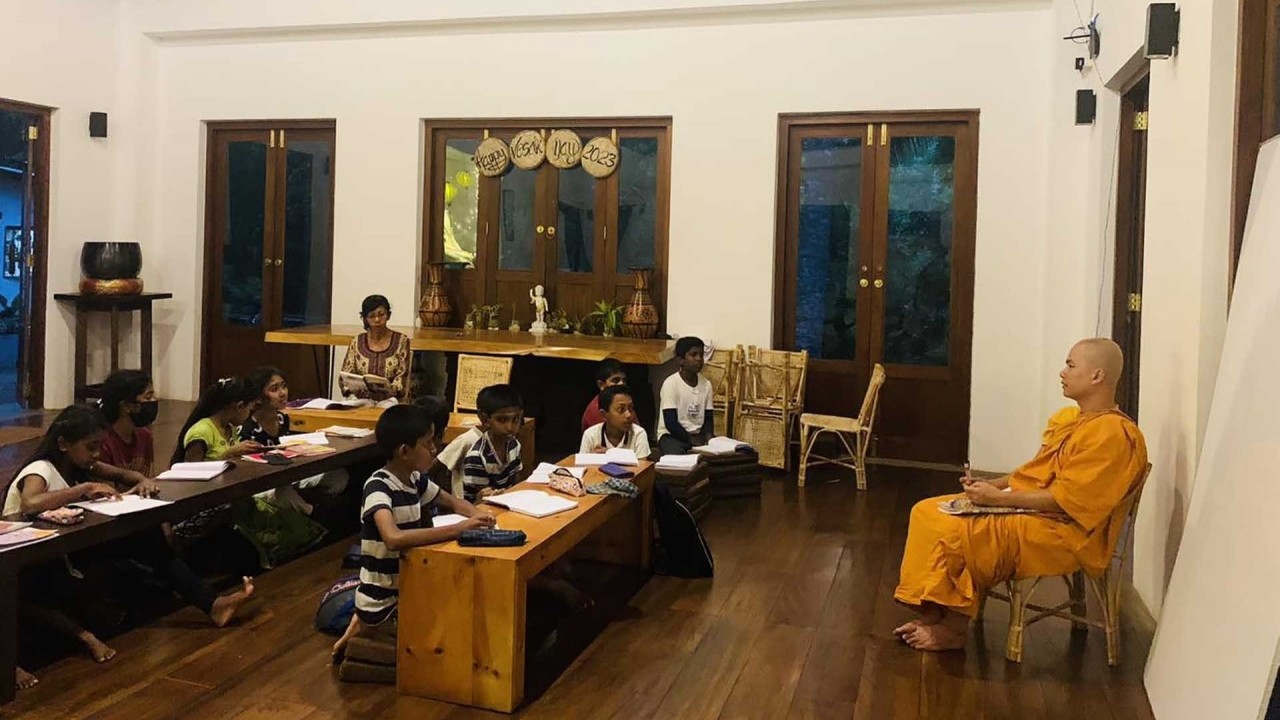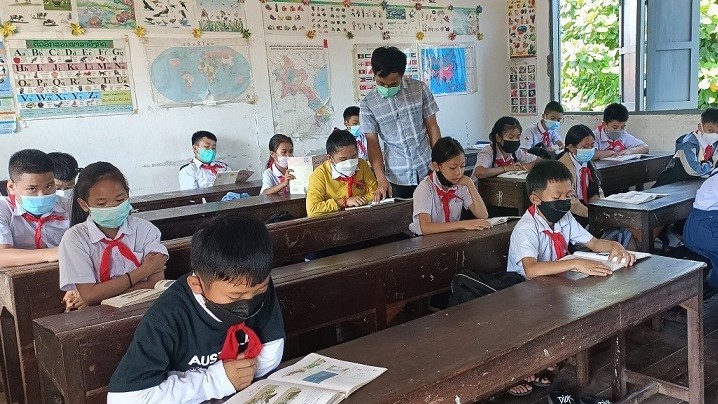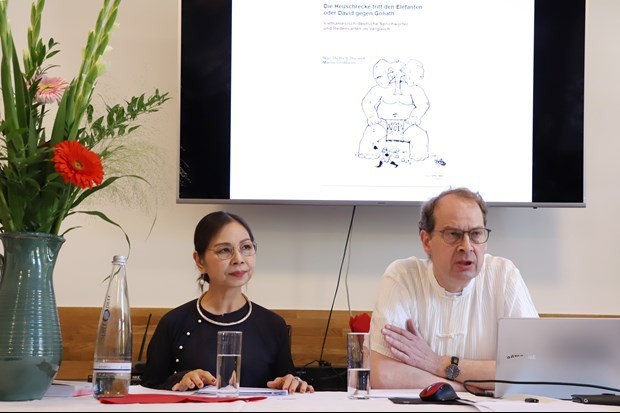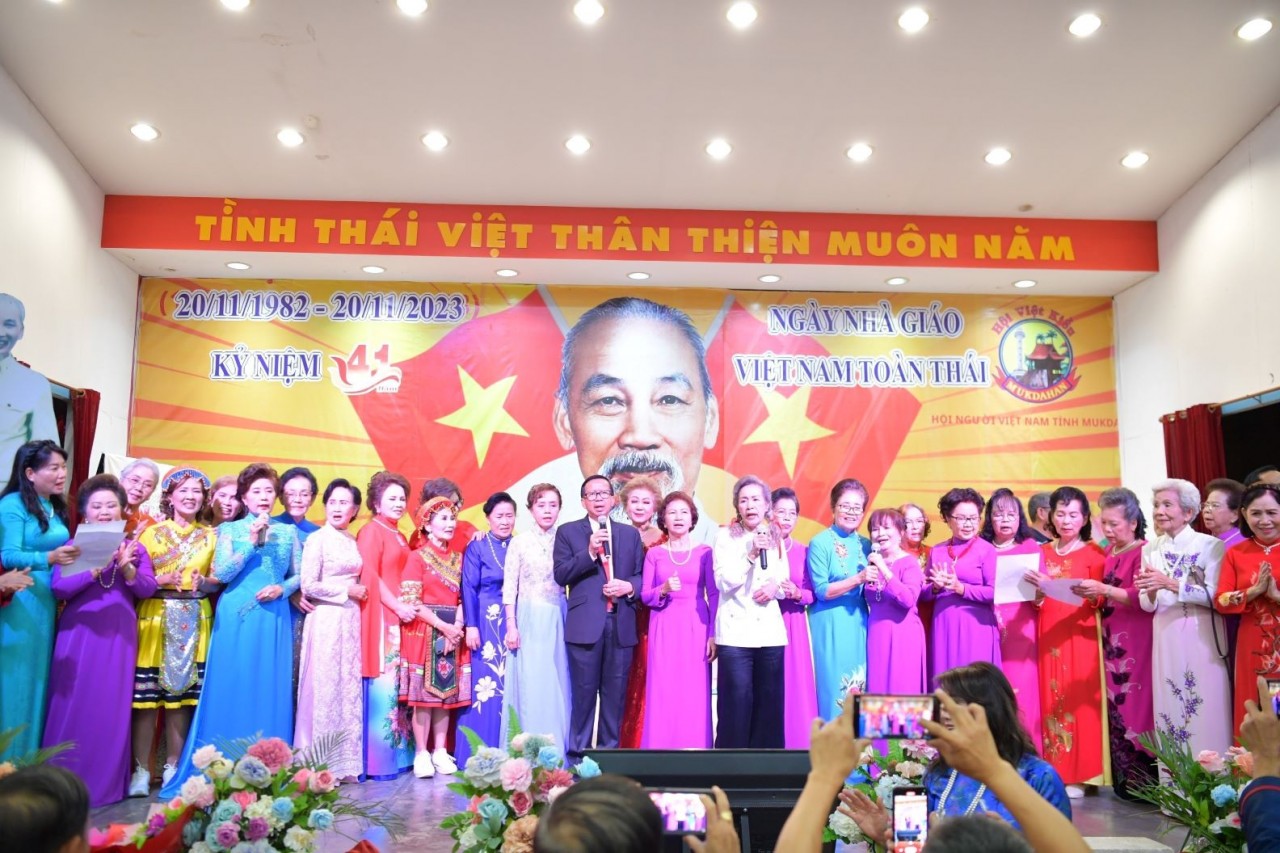
Teaching Vietnamese language abroad: Hearted desire for propelling the mother tongue in its far away flight
Latest
Developing and preserving the national cultural identity for the overseas Vietnamese communities have always been cherished by our Party and the Government. To accomplish this goal well, the teaching and learning Vietnamese for generations of Vietnamese expats is also considered as one of the key and constant tasks.
In the context of the Covid-19 pandemic, the annual language training courses could not be held off-line in Viet Nam. However, with the determination to continue promoting the teaching and learning of Vietnamese language for the Vietnamese expats, on October 9, the State Committee for Overseas Vietnamese (Ministry of Foreign Affairs) coordinated with the Ministry of Education and Training organized an online training course for Vietnamese teachers abroad with the participation of nearly 400 teachers – making it the largest teaching event ever.
Challenges and determination to overcome the impediment
In the past time, amid difficulties and challenges in many areas, the overseas teachers have always been dedicated and enthusiastic in teaching Vietnamese. Teachers like Ms. Nguyen Ha Chung in Japan, and Mr. Nguyen Truong Thi in Thailand have always felt proud to play the role of preserving the mother tongue. Therefore, they are always looking for a way to improve their expertise and professionalism so that the teaching can be most effective.
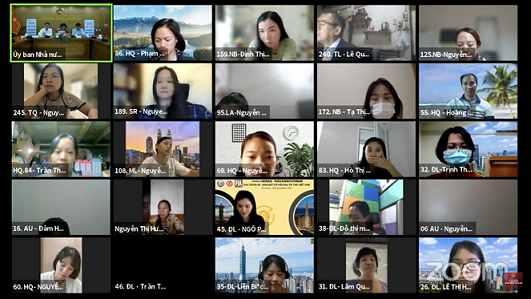 |
| Overseas Vietnamese teachers from various countries on an online training course. (Photo: An Binh) |
For Ms. Ngo Pham Tran in Taiwan (China), the biggest pride is that the Vietnamese language is becoming more and more important in that country. Especially since 2017, Vietnamese language has been introduced into Taiwanese schools as an official foreign language, and even many agencies and organizations have opened Vietnamese language classes for officials and employees to study.
Along with her teaching, Ms. Tran is also the Chairwoman of Taiwan-Vietnam Economic Cultural and Educational Development Association. Therefore, she regularly opens free Vietnamese classes for businessmen and workers at Taiwanese corporations having their investment in Vietnam and overseas Vietnamese children.
Teaching at Tokyo University of Foreign Studies, Japan National University, Ms. Tran Thi My is pleased to say that the demand for learning Vietnamese in Japan is increasing. Recently, Vietnamese language at school has always been one of the most registered subjects. However, the biggest challenge is that teachers who are well-trained in teaching methods in Japan are rare.
In Korea, teacher Vu Thi Thai Linh has been teaching for eight years at companies and foreign language centers for foreigners and children of Vietnamese-Korean families. She realizes that there is a great need to learn Vietnamese in the community and Koreans, but teachers are mainly "hands-on" amateurs.
From Hankuk University of Foreign Studies, teacher Vu Thi Thu Minh also said that although Vietnamese textbooks are plentiful, they are mainly written by Koreans. Because there is no accredited editor, many textbooks still have errors in vocabulary, grammar and gaps in Vietnamese culture.
Having a common interest in the course books, Ms. Nguyen Thi Mai Lan in China also wishes to have a set of methodical and authentic Vietnamese teaching course books, textbooks specifically compiled for teaching abroad. Because in her opinion, the application of Vietnamese language textbooks at home to overseas children is also not appropriate and difficult to access in their multicultural environments.
In Nakhon Phanom (Thailand), the Vietnamese language movement is growing strongly with diverse Vietnamese language classes for the community. However, as reflected by teacher Le Quoc Vi, the time for overseas Vietnamese children to learn Vietnamese is still a small fraction compared to the time for learning Thai language.
Therefore, in order improve the teaching of Vietnamese language making it effective and practical, he hopes that with the cooperation of the two countries' education sectors, Vietnamese language will soon become an official subject in schools in Thailand so that the Vietnamese expats’ children are taught methodically (in listening, speaking, reading and writing) right from the level of primary school.
| The Resolution of the 13th Party Congress identifies the development orientation of the country for the period of 2021 - 2030, which emphasizes the fourth content: "Developing comprehensive human-being and building an advanced Vietnamese culture imbued with national identity so that its culture can truly become an endogenous force, a driving force for national development and defense. Building, developing, creating the most favorable environment and social conditions to arouse patriotic tradition, national pride, belief and aspiration to develop a prosperous country of honor and happiness. The talent, intelligence, and quality of Vietnamese people are the most important center, the goal and the driving force of the country's development". |
Propelling the teaching of Vietnamese Language
Apparently, the State and Government have always paid special attention to preserving and promoting the Vietnamese language. Up to now, the Prime Minister has approved the Project "Strengthening online Vietnamese language teaching for Vietnamese expats" and the Project "Improve the effectiveness of Vietnamese language teaching for Vietnamese expats" with the aim of improving the quality of Vietnamese language teaching and learning.
On the side of the Ministry of Education and Training, Mr. Hoang Duc Minh - Director of the Continuing Education Department said that the Ministry has coordinated with the State Committee for Overseas Vietnamese Affairs to organize a training course for teachers and volunteers to teach Vietnamese language abroad in August every year in Viet Nam or in the host country if there is a request.
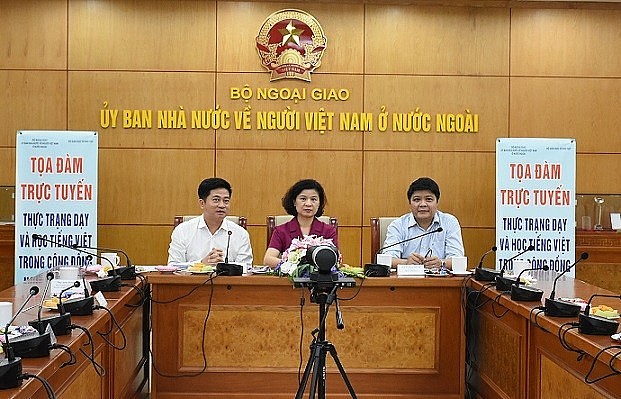 |
| Representatives of the State Committee for Overseas Vietnamese Affairs, Ministry of Education and Training, Hanoi University of Education in discussion with overseas teachers about measures to promote Vietnamese language teaching in the new situation. (Photo: An Binh) |
In fact, from 2013-2019, every year, about 65-70 teachers from many countries return to Vietnam to attend the training courses and receive certificates of completion, becoming the core of the Vietnamese language teaching and learning movement in the overseas Vietnamese community in host countries.
Customarily, this year, the training course was held online from October 9 to November 7, including two classes: the first class is designed for Asia-Australia region and the second class for the Europe - North America region.
As a lecturer from Hanoi National University of Education, Assoc. Dr. Duong Tuan Anh said that it was the enthusiastic and passionate participation of overseas teachers that became a source of positive encouragement for the lecturers and the Organizing Board of this year's online classes.
“Despite difficulties and challenges in different areas, all students and lecturers share the same desire to spread Vietnamese language further, and at the same time to love the cultural values with its traditional culture imbued in each word like cultural sediments. Along with methods and cultural knowledge to be imparted, the program wishes to connect love with national culture through the language”, he said.
Always accompanied by the homeland
Deputy Chairman of the State Committee for Overseas Vietnamese Affairs Luong Thanh Nghi said that over the years, our Party and State have always emphasized the preservation of cultural identity and national traditions.
Recently, at the Conclusion No. 12/KL-TW dated August 12, 2021 of the Politburo on the Overseas Vietnamese Affairs in the new situation and the Directive No. 25/CT-TTg dated September 10, 2021 of the Government on the promoting the implementation of Viet Nam's foreign cultural strategy, once again emphasizing the need to preserve and promote Vietnamese cultural identity, traditions and language in the Vietnamese expat community.
In response to the teachers' concerns about the course books, Dr. Le Thi Thanh Tam - Dean of the Faculty of Vietnamese Studies and Vietnamese Language (University of Social Sciences and Humanities, Vietnam National University, Ha Noi), announced the good news that a set of Vietnamese language teaching materials for Vietnamese expats (a collective Project composed by over 60 experts, professors, and doctors), has now been compiled and is in the process of commissioning for acceptance.
Besides, other valuable documents are also compiled such as bilingual textbooks for children, manuals for parents, reference books on culture.
Teaching Vietnamese abroad is perceived as a job that requires flexibility and creativity, Assoc. Dr. Vu Thi Tu Anh - Deputy Director of Continuing Education Department, Ministry of Education and Training, appreciated the efforts of the overseas teachers.
According to Ms. Vu Thi Tu Anh, in order to teach effectively, in each area, teachers should form groups to connect and share experiences with each other. On the other hand, to overcome difficulties in each country, teachers can proactively request support from their home country.
Ms. Tu Anh said: "We are always companies and ready to introduce teachers or introduce experts to travel to the country where the training is needed, under the support of the government or from socially mobilized funds".
| “The cultural identity and national traditions, especially the mother tongue, are the strength and intangible assets of each country. During his lifetime, President Ho Chi Minh once warned: The voice of the language is an extremely longstanding and extremely valuable asset of the nation. We must preserve it, cherish it, make it more and more widespread” - Vice Chairman of the State Committee for Overseas Vietnamese Affairs, Mr. Luong Thanh Nghi. |




